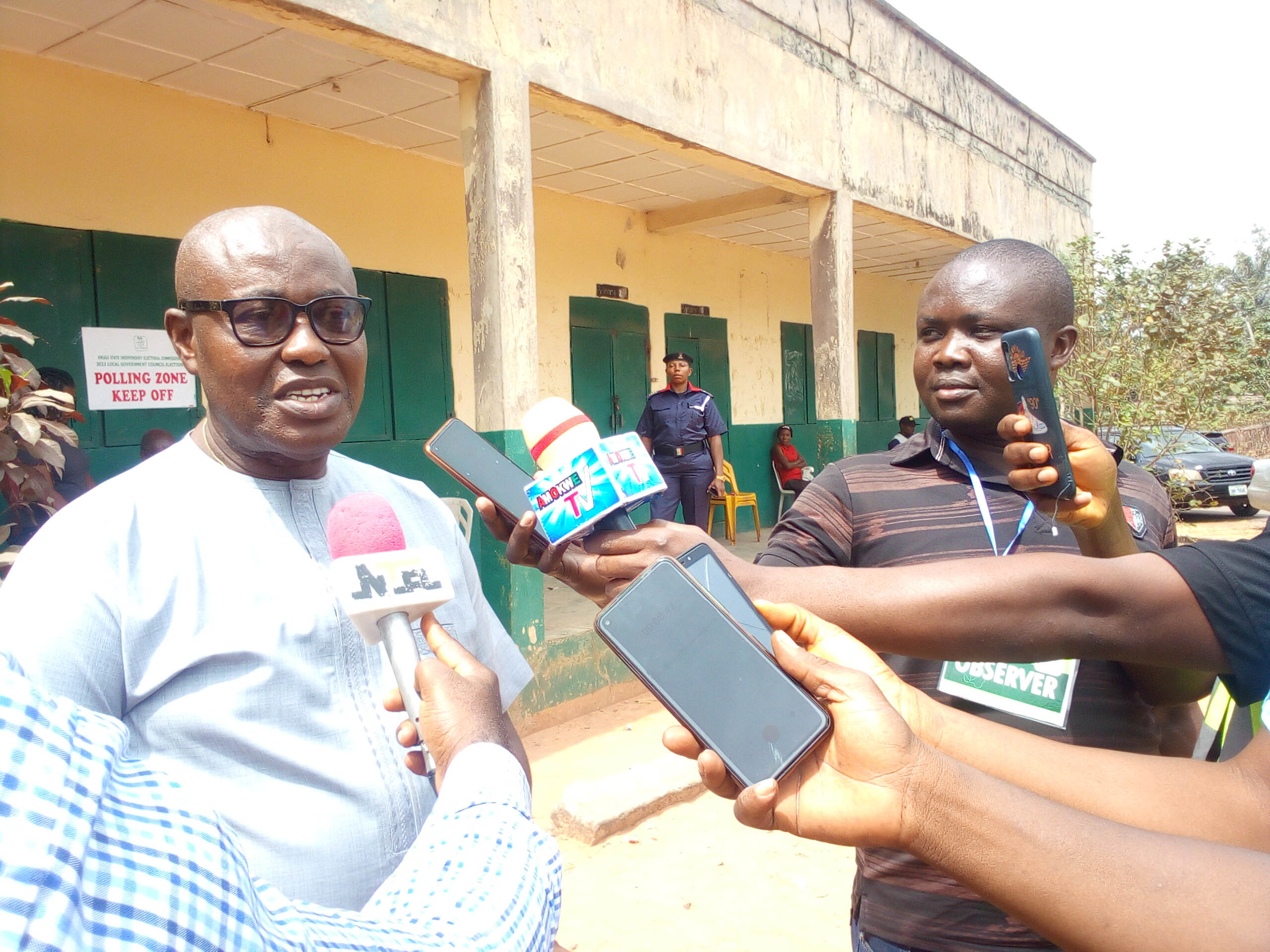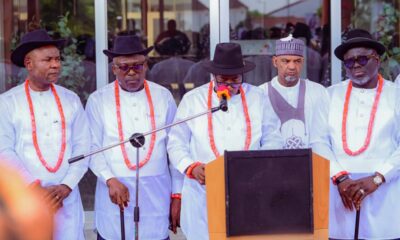News
Ogun Assembly Impeaches Speaker Over Alleged Embezzlement

The Speaker of Ogun State House of Assembly, Olakunle Oluomo, has been impeached by 18 out of 26 members of the State legislative arm.
The speaker’s impeachment was carried out yesterday during the House sitting presided over by the Deputy Speaker, Mrs Bolanle Ajayi (APC-Yewa South).
Oluomo, representing Ifo State Constituency was impeached over allegations of gross misconduct, highhandedness, lack of focus and transparency, financial misappropriation and pursuit of selfish interests.
The erstwhile speaker was reportedly at the June 12 Cultural Centre, Kuto Abeokuta attending the swearing-in of customary court judges a few metres away to the assembly complex, Governors Office, Oke-Mosan, Abeokuta when his colleagues moved against him.
The Assembly also elected Oludaisi Elemide (APC-Odeda) as the new speaker.
There were also reports of shootings by some security officers loyal to Oluomo who allegedly tried to stop the impeachment.
Adegoke Awoso (APC-Yewa North 1), moved the motion for the impeachment of Oluomo while it was seconded by Ademola Adeniran, another APC lawmaker representing Sagamu Constituency II.
Adeyanju, popularly called Awoso, had reportedly entered the assembly chamber with the mace in the company of other lawmakers.
Recall that the impeached speaker is standing trial over financial misappropriation of N2bn.
The Economic and Financial Crimes Commission (EFCC) had in September 2022 filed an 11-count charge bordering on conspiracy, forgery and stealing against Oluomo, and three other staff members of the legislative arm.
The charge was filed by the EFFC’s Lagos Head of Legal Monitoring Unit, Rotimi Oyedepo, at the Federal High Court, Abeokuta.
The ex-Speaker had, however, maintained his innocence saying that he would eventually be vindicated of the fraud charges.
Speaking to newsmen after being elected as the new speaker, Elemide said the people of the state should expect the best from him.
“We are law-abiding legislators. We want the world to know that there has been a change in leadership.
“18 members signed for me to be the speaker. People should remain calm. We are in the custody of all the authorities of the house. We are saying that the new leadership will support the governor.
“The governor does not know anything about this impeachment,” he said.
Also speaking to newsmen, Mr Damilola Soneye (APC-Obafemi Owode), noted that the office of the speaker is meant to be first among equals.
“The speaker was impeached due to gross misconduct which includes high handedness, lack of focus and transparency, arrogance and poor leadership style, financial misappropriation and inciting members against themselves,” he said.
The Commissioner of Police, Abiodun Alamutu, also visited the Assembly Complex to ensure law and order.
This is just as Awoso alleged that policemen shot at the tyre of his car while claiming to be searching for guns said to be in his car.
He said “The police shot at my tyre, they said they were searching for arms which a member claimed was in my car and by the time they searched everywhere including the engine, they found nothing. I am embarrassed to have been treated with such disrespect and disdain as if one is a common criminal”.
The Commissioner for police, however, said that he was at the Assembly to ensure law and order.
Alamutu said, “We are here to ensure law and order and we also picked up the information that arms were kept inside one of the cars at the Assembly Complex but it has been searched and nothing of such was found”.
The House has adjourned sitting for a week.
The Clerk and the Deputy Clerk, Mr Deji Adeyemo and Mrs Funmilayo Adeyemi were also at the plenary.
News
Fubara Attends PDPGF Meeting In Asaba …..Back Court Verdict On National Secretary Position

Rivers State Governor, Sir Siminalayi Fubara, last Friday, attended the Peoples Democratic Party Governors’ Forum (PDP-GF) meeting in Asaba, the Delta State capital.
The Rivers State Governor, who is the Vice Chairman of the PDP Governors’ Forum, attended the meeting, alongside 10 other Governors of the party’s controlled states across the six geopolitical zones of the country.
The first PDPGF meeting in 2025, was held at the Government House in Asaba, at the end of which a seven-point resolution was reached.
Reading the communique at the end of the meeting, the Chairman of the Forum, and Governor of Bauchi State, Senator Bala Mohammed urged the National Working Committee (NWC) to put every machinery in place to ensure a hitch-free NEC meeting on March 13, 2025.
The communique stated:
“The Forum, having examined all the notices required by law to be given to validly convoke NEC, advised NWC to reschedule NEC to the thirteenth (13Th) of March 2025.”
The Forum further noted the Court of Appeal judgment affirming Udeh Okoye as the National Secretary of the party, saying that as a party that believes in the rule of law, it will respect the position of the Appellate Court on the matter.
“The Forum noted with delight the ongoing efforts at resolving the crisis in the National Working Committee, NWC, on the position of the National Secretary, and has reaffirmed its support for the Court of Appeal judgment; consequently, the Forum advised the NWC to set up the machinery for the effective implementation of the court judgment.
“While commending the country’s valiant and patriotic Armed Forces and Security Agencies for maintaining the frontline in securing the country and the gains of our gallant personnel against bandits in parts of the country, the Forum viewed with deep concern, the resurgence of brazen non-state actors. It, therefore, calls for the strengthening of the nation’s security architecture.”
Governors in attendance include: H.E Senator Bala Abdulkadir Mohammed (Bauchi State); H.E Sir Siminalayi Fubara (Rivers State) – Vice Chairman; H.E Rt. Hon. Sheriff Oborevwori (Delta State) – Host; H.E Dr. Agbu Kefas (Taraba State); H.E Rt. Hon. Ahmadu Umaru Fintiri (Adamawa State); and H.E Dr. Dauda Lawal (Zamfara State).
Others are H.E Senator Ademola Adeleke (Osun State); H.E Senator Douye Diri (Bayelsa State); H.E Pastor Umo Eno Ph.D (Akwa Ibom State); H.E Dr. Peter Mbah (Enugu State); H.E Barr. Caleb Mutfwang (Plateau State);
and H.E Bayo Lawal (Deputy Governor, Oyo State), who represented Governor Seyi Makinde.
News
NGO Implants Free Pacemakers Into 22 Cardiac Patients In PH
A United States based Non Governmental Organisation, Cardiovascular Education Forum, in collaboration with the University of Port Harcourt Teaching Hospital (UPTH), has successfully implanted free pacemakers into 22 patients with different cardiac cases in Port Harcourt.
This is in a bid to save lives and encourage patients with low heartbeats to live longer.
The implantable device, which costs $20,000 each, was inserted free of charge on the selected patients.
Speaking during a Special Hospital Ground Rounds at the UPTH with its Theme, “Recent Advances in Cardiac Pacing,” a cardiac Physiologist, Dr Neil Grub, said the NGO was in Nigeria to improve training and learning on cardiac issues and help patients with cardiac problems.
Accompanied by a team of experts comprising a cardiologist and cardiac device implanter, Dr Jagdeep Siagh, and UPTH interventional cardiologist, Dr Edafe Emmanuel, Dr Grubb said pacemakers were inserted on patients with low heartbeats to boost their heart rates.
Earlier, the Chief Medical Director, UPTH, Prof Henry Arinze Ugboma, said each of the implantable devices cost over $20,000.
Ugboma, represented by the Chairman, Medical Advisory Committee, UPTH, Prof Datonye Alasia, said the partnership between UPTH and the foreign NGO was to build networks, and improve services in terms of healthcare delivery, training and learning.
According to him, there is now a ray of hope in terms of treatment of patients with cardiovascular cases in the hospital.
He said the UPTH started the collaboration with Cardiovascular Education Forum in 2018 to boost health, training and learning on cardiac health.
He assured that, “in coming years, the scale of our collaboration with the mission will be higher.”
Chinedu Wosu
News
FG Unveils National Broadband Alliance To Drive Internet Access
The Federal Government has unveiled the National Broadband Alliance, a new initiative aimed at transforming the nation’s digital infrastructure and boosting connectivity across the country.
The initiative was unveiled yesterday in Lagos by the Minister of Communications, Innovation, and Digital Economy, Bosun Tijani, who was represented by the Executive Vice Chairman of the Nigerian Communications Commission, Aminu Maida.
In his address, Tijani stated that NBAN would significantly enhance broadband penetration, which has grown from just six per cent in 2015 to approximately 42 per cent as of October 2024.
To support this agenda, he said the government was leveraging a Special Purpose Vehicle to deploy 90,000 km of fibre backbone across the nation, connecting underserved and rural communities to high-speed internet.
According to him, the initiative aligns with the Renewed Hope Agenda of President Bola Ahmed Tinubu, which prioritises innovation, technology, and collaboration as key drivers of national prosperity.
Tijani stated that the expansion would not only improve access to reliable broadband but also empower Nigerians, particularly in rural areas.
“While the progress made in broadband penetration is commendable, we recognise that much more needs to be done to ensure every Nigerian can enjoy the benefits of reliable, high-speed internet,” Tijani said.
The minister also emphasised the importance of strategic partnerships with donors, investors, and other key stakeholders in achieving the goals set out in the National Broadband Plan (2020–2025).
He said these collaborations would be essential in overcoming infrastructure development challenges and making broadband affordable and accessible for all Nigerians.
“These targets reflect our unwavering commitment to ensuring that broadband is accessible, affordable, and inclusive for all Nigerians. However, we are also aware of the challenges ahead,” he added.
Tijani stressed that achieving the government’s targets—70 per cent broadband penetration by 2025, a minimum internet speed of 25 Mbps in urban areas, and broadband access for 80 per cent of the population by 2027—will require sustained efforts.
“Achieving these goals will require more than just the efforts of the private sector. It will require a holistic approach that includes strategic partnerships with donors, investors, and other key stakeholders in accelerating the rollout of critical infrastructure,” he said.
-
Business9 hours ago
Oil Production Resumption: Ogoni Youths Seek Inclusion In FG’s Plans
-

 News11 hours ago
News11 hours agoSenate Reshuffles Committees, Appoints New Chairmen For Dev Commissions
-

 Nation9 hours ago
Nation9 hours agoBizman Alleges Threat To Life …Seeks Police , Govt’s Intervention
-
Rivers9 hours ago
NOSDRA D-G Disburses N150m To 300 Farmers In Rivers
-

 Niger Delta7 hours ago
Niger Delta7 hours agoOgoni Postgraduate Forum Tasks HYPREP On Scholarship Scheme
-
Business9 hours ago
NCDMB Assures Greater Local Industry Participation In Oil, Gas Projects
-

 News11 hours ago
News11 hours agoNigeria Strengthens Economic Ties With Germany To Boost Investment, Jobs
-

 Featured8 hours ago
Featured8 hours agoFubara Flags Off Upgrading Of 135 Primary Healthcare Facilities In Rivers

